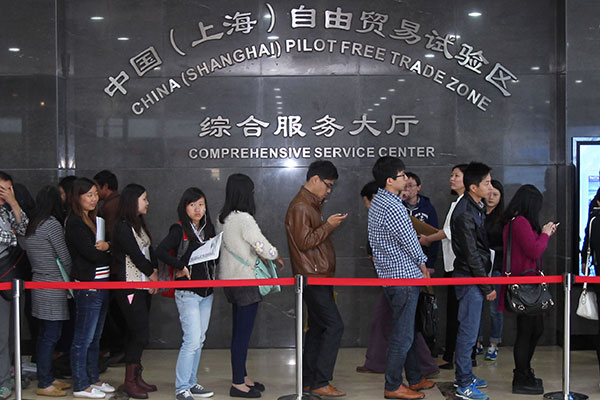
People line up at the service center of the China (Shanghai) Pilot Free Trade Zone.[Xu Congjun / China Daily]
The authorities in Shanghai presented a series of reform recommendations on Dec 29, to further open up the city’s highly successful China (Shanghai) Pilot Free Trade Zone.
The new measures were in response to 40 general guidelines announced on October 30 by China’s top leadership, to strengthen financial reforms and piloted programs at the zone.
Tu Guangshao, Shanghai’s deputy mayor, told a news conference that the latest plans include the further expansion of the zone’s free trade account to allow more organizations to take part in overseas trade and investment activities, especially with countries that China has signed new free trade agreements.
Tu urged banks, securities firms and insurance companies, especially, to make better use of the free trade account, and to come up with more innovative financial services to attract international business.
Zhang Xin, deputy director at the Shanghai branch of the People’s Bank of China, also pledged to provide sufficient financial support for ambitious outbound Chinese domestic companies.
Officially launched in June 2014, the scope of Shanghai’s free trade account has been gradually expanded.
In February, for instance, companies in the zone were told they may now borrow from overseas without prior consent from the authorities, and that they were no longer limited to borrowing just Chinese yuan. The scale of the financing was also doubled to up to twice the company’s capital.
Huang Xiaoguang, chief executive officer of ANZ Bank China, which was officially authorized to provide free trade account services in late November, said it has been able to lower financing costs for companies, calling the zone was “a milestone of deepened financial reform, further financial innovation, and controlled risk in China”.
By the end of November, 40 financial institutions had been connected into the free trade account monitoring and management information system.
Nearly 40,000 free trade accounts had been opened, with annual income totaling nearly 1.83 trillion yuan ($282 billion).
Zhang Yuepeng, the president of industrial product provider Dover Asia Pacific Co Ltd, which has its regional headquarters in Shanghai FTZ, said he expects more financial reforms to follow.
He said investors had already benefitted, particularly, from being able to transfer funds between their domestic and overseas entities via two-way cross-border RMB cash pooling, which allows multinationals to more conveniently allocate capital between group companies.
